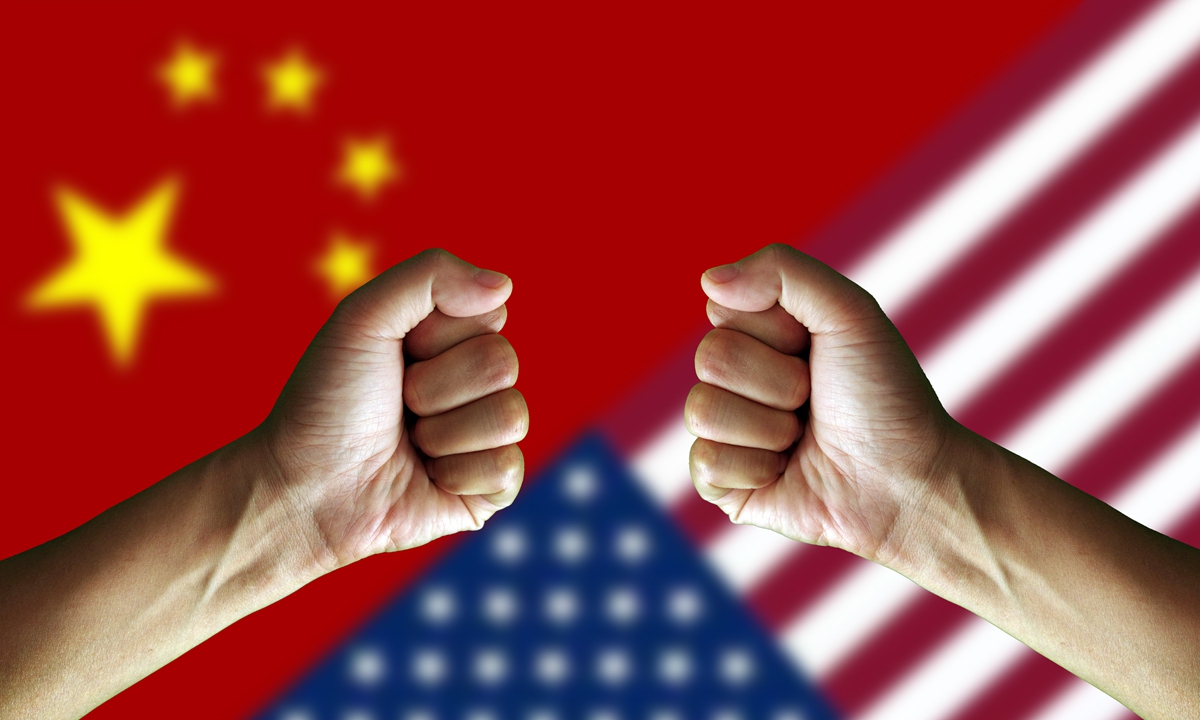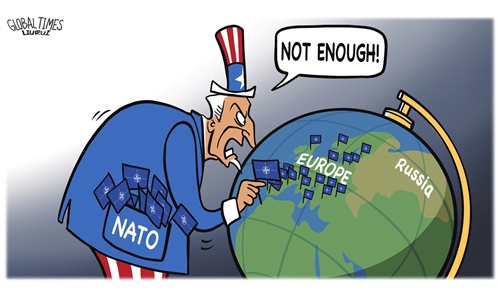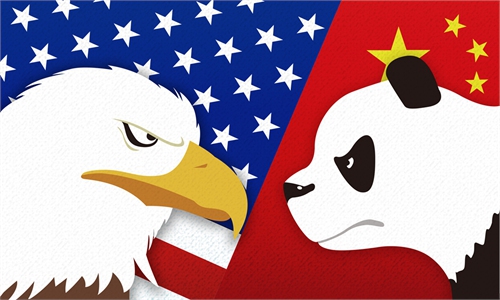US in an era of sound bites has no appetite for genuinely understanding China

China US Photo: VCG
Editor's Note:The hysteria toward China has risen to a new peak in the US. Political climate in Washington is increasingly weird in terms of China-related topics. Why is there so much irrationality on China in the US? How to view China-US relations from a constructive perspective? The Global Times (GT) interviewed several Chinese and American observers on these topics. The following is the third interview of the series.
Peter Walker (Walker), speaker on China-US relations and author of the book Powerful, Different, Equal: Overcoming the misconceptions and differences between China and the US, believes that the American public today, especially US politicians, media personnel, "in an era of sound bites does not want to take the time to understand the real history of China, and China's priorities." Walker said in terms of relationship, "until there is some appetite in the US for genuinely understanding China, it's going to continue to be a struggle."
GT:You published your book Powerful, Different, Equal in 2019 to call for China and the US to overcome misconceptions and differences. Former US president Trump launched a trade war with China at the time. Now more than two years have passed. How do you view the US domestic atmosphere regarding China? Is it becoming even worse? Why hasn't the US' China policy under Biden changed in the way that some analysts predicted?
Walker: I think you have to really go back in history a little bit to understand how we got to where we are. The first thing I think to understand is that the US-China relationship before Trump was always reasonably good. There were periods of tensions. But overall, the tone on the two sides was pretty positive. There was very active trade going on. That was really the most important trading relationship in the world. You had hundreds of thousands of Chinese students going to schools in the US and there really wasn't much going on in terms of either violence or accusations one side to the other.
All that changed under Trump. Why did it change under Trump? I think it's very important to remember that the US economy was going very strong. After a COVID hit, Trump did everything he could to downplay COVID. So he basically said this is going to be gone in 30 days; this is not significant; this is just going to be like the flu; it's not going to be serious. All of which was totally ridiculous. But his attempt was basically to demonize China as the source of COVID without really any proof. I mean, no one's ever proved how it actually got started, and then he started naming it. He called it "kung flu" in one of his speeches. So we have to go back to the idea that this tension was created purposely by Trump to divert attention from the fact that he did such a terrible job dealing with COVID. So the US to date is approaching over 1 million deaths, the worst performance in relation to population anywhere in the world.
And once he started going down that road and blaming COVID on China, he then started using all of the standard rhetoric that China is not a "democracy," the people aren't happy, China "stole" our intellectual property. And because America has become a soundbite country thanks to the internet, there's really very little reason, dialogue and facts, because most of these arguments that are made - if you just look at the facts, you can basically say they don't make any sense. But if you're in an environment where people just want to hear very simple answers very quickly, then you can come out and say things like China is a communist country and it's bad, like China is communist, therefore, they're just like Russia. That's not true. But to explain it's not true, you have to have someone who's willing to listen. But nobody's willing to listen.
Then obviously, the situation that makes it worse is the fact that China and Russia agreed to be partners in a fairly strong, overt way. If you're in the US and you're looking at the news every night, you see that Russia invaded Ukraine. You think of China as the partner of Russia, then all of a sudden, you put those two things together. China becomes not just a bad guy, but a very bad guy, even though China's relationship with Russia really hasn't changed. China is not doing anything to overtly support the military effort of Russia. And the trade that it's doing with Russia is the same trade it's always done.
So I think it's very important to understand that historic context to understand why that relationship has not gotten better. A lot of people did hope that under Biden, it would get better. But the problem is that when Biden and Trump ran against each other, it was a very close race. And Trump positioned himself as the guy who is tough on China. So Biden was very afraid that anything he says or does that isn't tough on China will be converted in the media to make it seem that Biden is soft on China. If you go back 10, 15 years ago, Biden was very clear in saying China is not our enemy and China is our friend. So to me, that's what he actually believes. But because of the media attention and what Trump did to paint China as the evil empire, Biden felt he had to stay with that party line or he would be vulnerable politically.
GT: US elites, including the media and politicians, are supposed to help the public to foster a correct understanding of China. But what we see now is that they talk a lot about the so-called China threat. Why has this situation come about?
Walker: There are a couple of things that are important to understand. One is the US has become a very polarized country. When you have a polarized society, as opposed to a society that's made up of balanced, moderate people, then the loudest voices become the voices at the extreme. And that's what happened. In the US the media are in business to sell papers and to capture eyeballs on video screens and TVs. They are going to put out what people want to read.
So if a big chunk of the population in the US has come to believe that China is the threat, the media writes about that all the time. It sells papers, even though the factual underpinning of it is not there. So the media is not there to educate; the media is there to tell people what they want to hear and the politicians are very much the same.
Politicians who criticize China know almost nothing about China. If you were to ask most US congressmen about the history of China, or ask them about the essence of Confucian values that have played such a critical role in China for 2,500 years, they don't have a clue. They would say Confucian, that's about Confucian Institutes, and that's where spies are, which is ridiculous. But does it sell papers? It sells papers. Does it help politicians to be elected? Yes, it does. Because the American public today, in an era of sound bites, does not want to take the time to understand the real history of China, and China's priorities.
The people in China are happy. Why are they happy? Nobody ever asks such questions. So instead, you get something like China created COVID and that's the reason the world is suffering and why economies are slowing down. It's very frustrating for me, because you basically read things that you know from firsthand experience are just not true.
GT: As the most important bilateral relations in the world, China and the US must find the right way to get along with each other. What do you think are the key elements for this?
Walker: In terms of the relationship, obviously the US needs to understand more about China. I tried to do that with my book, but at the end of the day, there was very little interest. My book did very well in China. But I don't know how many copies I sold in the US.
In the internet society, we have become a nation that communicates in sound bites. If I were being interviewed on television in the US and someone says tell me about China, they would always say you have two minutes. Well, how do you describe a country that complex with that history, with a totally different culture, in two minutes? You can't do that. So the reason my book was not successful is that people would look at it and say I don't have time to read a book. Give me the overall answer. Is China a good country or a bad country? Is China a threat or not a threat? I'm sorry, it's more complicated than that.
But when I took the same book which had been translated into Putonghua to China, we did a book launch, and we had 640,000 people who watched that book launch. The book was rated No.1 in foreign affairs for a period of time in China. Why? Because the Chinese people were interested in understanding not just a Westerner's view of the China model, but also they wanted to understand the history and culture of America, which has also been a very successful country. So until there is some appetite in the US for genuinely understanding China, I think it's going to continue to be a struggle.
There is another thing China can do that would be very helpful. It's totally human nature that when the US criticizes China, which it does far too often, China is going to want to fight back, but China could just say: Look at our results, our people are happy, our GDP is growing, we are minding our own business, we're not going to get into a war of words with America. America's got a lot of opportunities, but also has a lot of its own problems; we wish America could solve its problems as we focus on ours.
I watched the meeting in Anchorage. The US started that meeting in a very condescending way and said here are all the things China is doing that we don't like. You can't start a conversation that way without inviting the response that the Chinese gave America, which was basically fair. Their response was: You have a lot of problems, too. So before you criticize us, why don't you solve your own problems?
The people who really understand the other side are businesspeople. When you talk to Americans who have been doing business in China for a long period of time, they totally understand that the government is in charge. They understand that the quality of people in government is very high. They're highly educated. They understand that the Chinese work incredibly hard and therefore are able to produce things at a lower cost than other countries can. They understand the importance of guanxi is much more important than legal contracts. But unfortunately, the American businesspeople are very cautious about praising China, because the government and the media in the US will say you're pro-China, you must be the enemy.
I know a lot of businesspeople who basically say, we love doing business in China and we want to continue to grow our business in China. But we have to be very careful about what we say. And so the people in China who understand America the best are the Chinese businesspeople who have operations in the US or who are trading partners with the US because they understand what you have to do to succeed in that relationship.
So I would say going forward, anything that can be done to empower the business community in the US and the business community in China to work together and to create opportunities will benefit the people on both sides. But it's going to be hard because right now, the tone in the media and in Washington is not to encourage that. It's discouraging.


